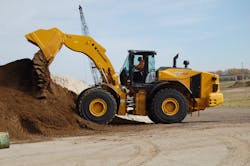As an equipment buyer, you win because David still gets in the ring with Goliath.
Competition means choice.
It’s one of the reasons for antitrust and anti-monopoly laws. You don’t want an industry with just one or two suppliers doing business their way with little competition and virtually no incentive to do at least some things your way at a reasonable price. (Try not to think about public utilities or the oil industry…you’ll just get angry.)
Kawasaki is one manufacturer playing the role of David in our industry. It’s been making only one product for construction—wheel loaders—for 50 years. Kawasaki takes on bigger companies like Caterpillar and John Deere through a network of more than 80 dealers, and has carved out its own niche selling 15 models distinguished by their ultra-thick loader arms and cylinders, among other features.
To say owners depend on their Kawasaki loaders is a bit of an understatement. Some 60 percent of Kawasaki customers have but a single wheel loader on site, meaning there’s nothing else around to bail them out. The machines simply have to stay on the job.
Aside from a reliability factor, how does Kawasaki stick around and continue to offer just one machine category?
Specialization.
“We do one thing and one thing only; our engineers are not dealing with four or five different product lines,” says Sam Shelton, marketing administrator for Kawasaki.
“Our wheel loaders are not cookie-cutter,” Shelton says. “Everything is tailored to the owner. The more options you can get as standard on a product, the better. What sets us apart from the multi-liners is that while others may have a list of options, we take the options from previous generations and make them stock.”
Shelton says some manufacturers “dumb down” a model or offer a more basic product with fewer options and lesser components for certain markets. That means an owner might get less than a company’s best.
“Every loader Kawasaki produces is custom,” Shelton says. “How do you tell an artist to give less than 100 percent?”
While it may be hard to wrap your head around artistry and an assembly line, there’s still a point about originality.
Even the company’s options are factory installed. “We’re not relying on dealers to do our customizing—we bring OEM suppliers into our factory,” Shelton explains. “If you go outside for customization, you open it up for inconsistency and it adds another level of expense.”
Original thinking has also permeated the company’s dealer relations and marketing. They’ve had to adopt a number of tactics behind the scenes to keep competing with Goliath.
Because Kawasaki dealers are usually selling other lines of equipment (some more than 10), the company has a fight on its hands to earn a dealer’s time and resources. Add in the effects of the recession and you realize it’s battling for the attention of fewer dealer personnel pulled in more directions than ever before.
Kawasaki has had to go against the grain to survive. “We didn’t reduce regional sales management during the recession, we expanded,” Shelton says. “The only way we can collect the resources we fight so dearly for is to stay in front of the customer, and the salesperson who makes their living selling our product. We had to be that employee they [the dealership] no longer had.”
For greater dealer advertising mileage, Kawasaki has partnered with other one-category or short-line players like Link-Belt (LBX for excavators) and Takeuchi. LBX shares 70 percent of Kawasaki dealers. Like a lot of what the company does, it’s sound strategy.
Kawasaki has also increased dealer and customer training, particularly with the advent of its new Z7 Series Tier 4-Interim loaders, proving that a manufacturer known for ruggedness can embrace technology change.
“Many customers can’t afford to train and maintain their own in-house mechanics on Tier 4 technology, so we’re seeing maintenance contracts being written into sales contracts at an increased rate,” Shelton says. “We also have to be creative with demo programs, locally and nationally.”
Kawasaki has had to become more creative in finding customers financing packages, as well. It views the fact that it does not have an in-house financing arm as a plus that allows it more freedom to shop around.
Combined, the company’s creative approaches have led to more customer touches during a downturn and it continues to stay in the fight. The result? You have another option when you consider a loader purchase.
Sometimes it pays to cheer for the underdog.
About the Author
Frank Raczon
Raczon’s writing career spans nearly 25 years, including magazine publishing and public relations work with some of the industry’s major equipment manufacturers. He has won numerous awards in his career, including nods from the Construction Writers Association, the Association of Equipment Manufacturers, and BtoB magazine. He is responsible for the magazine's Buying Files.

